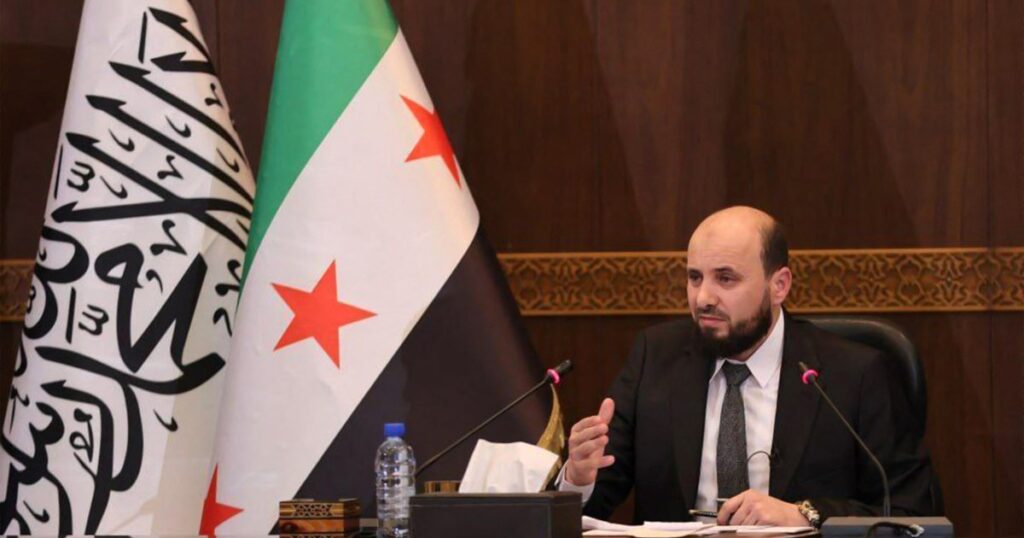After toppling the regime of Syria’s President Bashar al-Assad, Hayat Tahrir al-Sham (HTS) leader and commander-in-chief of the new administration, Ahmed al-Sharaa, has appointed Mohammed al-Bashir to lead a caretaker government until March 1.
The move aims to stabilise the country by providing basic services to civilians and preventing a power struggle between armed groups over state resources and ministries, experts told Al Jazeera.
“[A caretaker government is needed] to ensure the state keeps functioning and that people have electricity, water sewage and the internet,” said Thomas Pierret, an expert on Syria for the Institute for Research and Study of the Arab and Muslim World.
However, the caretaker government – and HTS – could lose credibility if it refuses to share power after three months, experts have warned.
Here’s what we know about the caretaker government and its head:
Who is Mohammed al-Bashir?
The head of the caretaker government is a technocrat who headed the Syrian Salvation Government (SSG) in Idlib, a province in northwest Syria.
After the Syrian uprising erupted in March 2011, Idlib became an opposition stronghold. By 2017, HTS consolidated control and created the SSG out of civilian technocrats.
“Mohammed al-Bashir … has done a reasonably good job in Idlib,” said Robin Yassin-Kassab, an expert on Syria and the co-author of Burning Country: Syrians in Revolution and in War.
“I understand that it makes sense to scale [the Salvation Government] up to the whole of Syria, for now,” he added.
Al-Bashir’s background in electrical engineering, project management and administrative planning suggests he has the professional know-how to maintain basic services in the country, analysts said.
He first emerged as a minister in the HTS-backed Salvation government in 2021, according to the caretaker government’s official website
For two years, he served as the head of development and humanitarian affairs, according to Assaad Al Achi, executive director of Baytna, a non-governmental organisation that supported local civil society groups in Syria throughout the war.
“He was definitely interested in humanitarian work because that’s where the money was,” Al Achi said, referencing the SSG’s policy of taxing aid organisations.
On January 13, 2024, the Shura Council in Idlib elected al-Bashir as prime minister of the SSG.
Who are the other ministers?
Al-Bashir has told Al Jazeera Arabic that, for the time being, the ministers from the SSG would take over the national ministerial portfolios. The current ministerial lineup is:
- Minister of Interior Mohammed Abdul Rahman
- Minister of Economy and Resources Basel Abdul Aziz
- Minister of Information Muhammad Yaqoub al-Omar
- Minister of Justice Shadi Muhammad al-Waisi
- Minister of Agriculture and Irrigation Mohamed Taha al-Ahmad
- Minister of Health Mazen Dukhan
- Minister of Development Fadi al-Qassem
- Minister of Local Administration and Services Mohamed Abdel Rahman Muslim
- Minister of Endowments Hussam Haj Hussein
- Minister of Education Nazir al-Qadri
- Minister of Higher Education and Scientific Research Abdel Moneim Abdel Hafez
Is there going to be a transition?
Despite al-Bashir’s prominent role, Al Achi does not believe the caretaker prime minister has ambitions to consolidate power over Syria.
“What worries me is if [this caretaker government] extends [its term] for more than three months, but if it just for three months … then that’s alright,” he said.
Experts are concerned that HTS will try to rule all of Syria with an iron fist.
According to a report by the Syrian Network for Human Rights, HTS subjected critics and opponents to enforced disappearances and tortured people to death.
Al Jazeera asked the HTS media office to respond to these allegations, but they had not commented by the time of publication.
Setting up to succeed
The caretaker government and HTS could ease concerns of a power grab by proposing a roadmap detailing when negotiations with other stakeholders would begin ahead of forming a broader coalition, Yassin-Kassab told Al Jazeera.
He added that a plan should aim to implement UN Security Council Resolution 2254, which calls for a transitional period of 18 months, during which an inclusive coalition will draft a constitution and prepare for elections under United Nations supervision.
“[HTS] need to say this is the beginning of a process that will involve every aspect of society and all political leaderships,” said Yassin-Kassab.
“That would reassure Syrians and the international community and give the new government much more legitimacy.”
Who’s going to pay for the transition?
Syria’s economy is in tatters – the World Bank ranks its gross domestic product (GDP) at 129 out of 196 states.
HTS managed to raise revenue during its rule in Idlib by taxing residents, as well as goods and relief passing through from the Turkish border. However, it is unclear whether the group has enough finances to bolster the economy and supply basic provisions in the short to medium term.
Experts believe HTS can be incentivised to share power by linking sanction relief to political reforms.
Syria is on the United States list of “countries that sponsor terrorism” and, on top of that, HTS is considered a “foreign terrorist organisation” by the European Union, Turkiye and the US.
The EU and US have also sanctioned much of the Syrian economy, including the energy sector and the trading of goods related to technology or electricity provision, according to Human Rights Watch (HRW).
It’s imperative that HTS shares power with other stakeholders and civil society in order to convince Syrians and the international community that the group has changed, argues Yassin-Kassab.
“[I]t remains to be seen if this is the beginning of a power grab by HTS and HTS-aligned civilian bodies,” he told Al Jazeera.
“I certainly hope not.”
